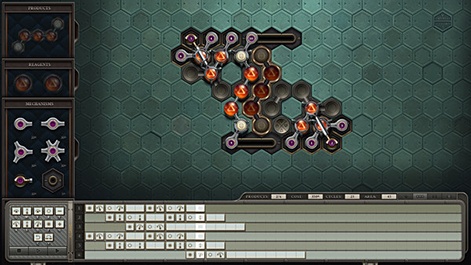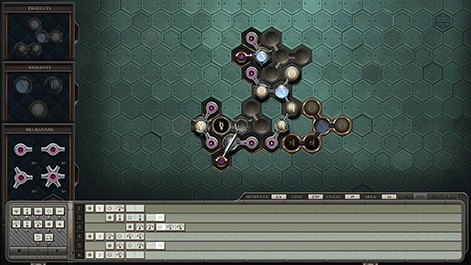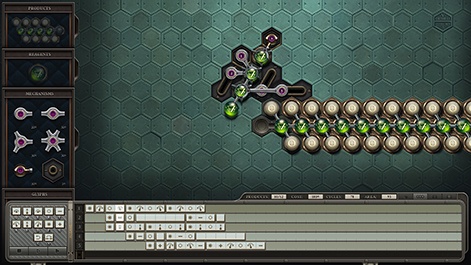If you have dipped your toe into video games Twitter since October, you'll no doubt have seen Opus Magnum in action.
The sixth title from Zachtronics has been all over the social media platform with users sharing gifs of the game in action. Opus Magnum sees players performing alchemy with a mechanical infrastructure that's incredibly satisfying to watch.
This, the studio's founder Zach Barth, was the thinking behind Opus Magnum.
"Instead of a lift pitch for Opus Magnum, I would say just look at the gifs," he tells PCGamesInsider.biz.
"It's funny because if you try to describe it with words, it's not actually very exciting. 'You built an open-ended puzzle game where you make machines and do alchemy' – that doesn't mean anything, and that certainly doesn't conjure up the images that a gif does. The gifs are actually the closest thing to our elevator pitch. In place of these words here, put a gif."
The gif aspect came about following the studio having a video exporter in 2011's Space Chem. That would automatically upload videos to YouTube and was something the studio tried to do again with 2015's Infinifactory but this didn't work out so the feature was ditched. After launch, a fan made a looping gif of their solution to a particular problem, inspiring Barth to find a new use for Infinifactory's video player.
"I went back into the code, pulled up the video editor that we had canned and converted it into a gif exporter," he says.
"We shipped it and it was amazing. Everyone was uploading gifs on Reddit and Twitter. As soon as we knew what we were doing in this game, we knew the gif thing would work, and it was going to be our primary marketing focus.
"Marketing at Zachtronics is an exciting thing because I don't really believe in it. A lot of indies think it's very important to pay someone a few thousand dollars to email YouTubers and Twitch streamers about your game and I don't want to do that. For us, marketing was making the game shit out gifs that everyone is going put on Twitter. It seems to have worked."

The game is a spiritual successor to one of Barth's previous Flash projects, 2008's The Codex of Alchemical Engineering. That title, Barth says, solidified the process by which him and his team design puzzle games.
"In a traditional puzzle game you're giving a solution that's missing pieces and you have to put the pieces back into that solution to make the solution the designer intended," he explains.
"Sometimes you might get lucky and there could be two ways to solve a puzzle. In all our games, we give you a set of tools and we give you challenges with those tools. The tools and the challenges are specifically designed separately so you can apply the tools in any number of ways. Oftentimes, this ends up a bit like programming, but sometimes they're more physical like Infinifactory."
Opus Magnum, much like TIS-100 and Shenzhen I/O, was launched via Early Access. While not unheard of, releasing puzzle games onto the platform is somewhat unusual. Valve's alpha launch programme has, historically at least, been ruled by big and ambitious survival games.
"It's been great for us. I'm not sure if this is controversial or not, but Early Access is two words that you can slap on your game and that's it. It's up to how you use it to communicate," Barth says.
"For us, when we put Early Access on something, it says: 'This is a game that we are comfortable releasing, which means it's almost finished, but it's not finished' and that's important because if people have feedback, compliments, complaints, stuff they want to see more of, or stuff they want us to add to it, they can feel comfortable telling us that and we're open to that and we want to hear that and we want to incorporate that into the game to make it better.
"At some point when we think we've pulled in all the good feedback and the stuff we can do with the time we've been allocated to the game, then we have released it. That's how you know that it's done. It's not that we don't want to hear your feedback, it's more that that period of taking user feedback and using it to heavily modify the game is over. We just use it as two words that we can use to communicate that to people. For the most part, people get it. There's sometimes confusion as to the quality level, but our fans have learnt after four games this way that you don't have to feel stupid buying an Early Access Zachtronics game on Day One because it's not going to be bug-riddled and poorly-designed. It's the game we would have released if it was ten years ago and Early Access wasn't a thing. It's worked out well."

Unlike a lot of projects, especially veterans of Early Access, Barth says that by and large once its titles are out no more work takes place.
"Opus Magnum out of Early Access. That's meant to show that we're pretty much done with it," he explains.
"There's still some bug fixes occasionally that pop up. We might add some more puzzles. We might add something where users can create their own puzzles and we pick the good ones and clean them up and put them in the game. We have done a lot of those - it's always possible we'll have more submissions that we want to put into another issue of that. We normally try to wrap up our games and try to move on. Especially with Early Access titles, you see games that are in development for years and years but that is not our style. These are puzzle games - people pick them up, play them and finish them and then move on. It's not an eternal game, it's not an evergreen game as some people call them, so there's not really a reason to keep working on it forever.
He continues: "We're working on another game now, but don't have anything to share about it at this time. You'll have to wait and see and be surprised."

The game was released out of Early Access in December, and while Barth won't share sales information with us, SteamSpy pegs the game as having sold in the region of 63,0000 copies. Asked how he feels has performed versus his own expectations, he says he is happy with the game's performance.
"It did about as well as we expected, maybe a little bit better," Barth says.
"This is our sixth commercial game. When we launched our first game ten years ago, we were full of excitement. We were nervous about how a game would do. I was hoping to make $10,000 off Space Chem because that would have covered all our costs, but it went on to sell over $1m-worth of copies. That was exciting. It was when indie games were just getting started and we had never released a commercial game before. Now we have released six commercial games and know what it's like. It's just like that every time.
"The funny thing is that it's getting to the point now where releasing a game is the least exciting point. You have to go through the motions of releasing a game and reading feedback and answering emails. I do all of our support, so I get slammed with support emails. The really fun part that's different on a per-project basis is when you're making it. Launching a game gets samey, It gets boring. A lot of indies haven't released that many games. Your first game isn't boring. With the second, you don't know what to expect, so that's not boring, and that's either going to do better or worse than your first game, probably worse if you're a successful indie. Our sophomore game did a lot worse than our first game. That happens to a lot of indies. That's going to be a shock. By the time you get to the sixth one, if you even get the chance to do six indie games, it means you have something down, some sort of rhythm.
"If you're actually the person who is emotionally leading the process of launching it time after time after time, you realise that it's not the exciting part. If one of our games suddenly flipped the script and became a PUBG kind of hit, that would be exciting and crazy and I wouldn't know what to expect. But that's probably not going to happen anytime soon.
"What is the goal of making these games – to make something successful? A lot of people don't make something that's PUBG successful, so maybe that's not the goal. Maybe that's a thing that sometimes happens to some people."
And speaking of success, after initially being rejected by GOG.com upon launch, Opus Magnum has finally launched on the DRM-free platform. While Barth can't, or won't, go into details about the process of getting the project on GOG, he says he's proud to be there.
"One of the things I’m most proud of about Zachtronics is that we’ve been able to make so many different games," he says.
"So it’s satisfying to see that Opus Magnum, and therefore our entire catalogue of games, is now available on GOG."
















